





Our department members continue to be recognized for their outstanding quality in research, teaching, and service. This year, three former graduate students, Christal Schoen (Ph.D. class of 2020, advised by Douglas Lapp), Bridgette Russell (Ph.D. class of 2023, advised by Christine Phelps-Gregory), and Hiruni Pallage (Ph.D. class of 2024, advised by Yeonhyang Kim), were named Project NExT fellows for the Mathematical Association of America. This is a prestigious award for early career mathematicians and we could not be prouder of these burgeoning forces within the field. They each embody the very best of what the Department of Mathematics at CMU has to offer.

DEPARTMENT CHAIR
Ben Salisbury

The Fleming Lecture Series will return this year with Steven Bell visiting CMU in April 2025. He is Professor of Mathematics at Purdue University known for his work in complex variables and partial differential equations. He will give two lectures, on April 17 and 18, respectively. The first talk will be aimed at a general audience, while the second talk will be aimed at a more mathematically mature audience. Details will be posted on the Department of Mathematics website when finalized.
For the first time in nearly three decades, if you enter the department office, there will be a new face to greet you! Donna Ahlers retired in 2024 after leaving an indelible mark on the department, the countless faculty who benefited from her expertise, and legions of students. Now here is Michelle Mowat, and she has acclimated very nicely over her first few months. If you have not already had the pleasure of meeting Michelle, please make it a point to stop in and introduce yourself!
Since this is my final year as Department Chair, it is my final time writing this introduction. Please allow me to thank the entire department for their support over the last six years. We navigated some unforeseen and never-before-seen circumstances of both global and local origin. Together we figured it out and developed a stronger and more determined department as a result. I am proud to have been chosen to serve you over this period and to have been part of the changes and growth in the department over the last five-plus years.
A huge thank you to the Newsletter and Alumni Committee – George Grossman and Xiaoming Zheng – for putting this newsletter together! Thank you to Rob Wang in the College of Science and Engineering for assembling and publishing the newsletter. Thank you to the faculty in the department and student groups for sharing about all the exciting events, activities, and successes of the last year. Last but not least, to our alumni, thank you for your continued support and encouragement ¬– we hope to see you around Pearce Hall this year!

Our organization is dedicated to furthering mathematical scholarship and research. We hold regular meetings which provide a forum for graduate students to present their academic interests in a welcoming environment. We also organize trips to nearby conferences, outreach in the local community, and other events designed to establish and cultivate relationships with others that are excited about mathematics at CMU.
Membership in the chapter is open to any mathematics graduate student at CMU.

Sibs & Kids: The AMS chapter partnered with Professor Chan of the math department to run an activity room as part of CMU’s 2024 sibs & kids day, and it was a blast! The many attendees had a great time playing and learning about dinosaur-themed math.
Pi Day: Could we really call
ourselves a math organization if we didn’t celebrate Pi Day? Every year, we like to invite the department to a celebration of our favorite irrational number! This past Spring, we gathered with the whole math department to play games, give talks, and, of course, to eat some delicious pie! (Right, Spring 2024)
Integration Bee: This year, we celebrated another annual AMS Integration Bee. The night was filled with fun, laughter, competition, good food, and of course, calculus! In our undergraduate bracket, the grand integrator was Izzy Gaidhane, and the runner up was Jonathan Gregory. Both Izzy and Jonathan were Math REU students during Summer 2023. In the graduate bracket, the grand integrator was Joyita Banerjee. (Left, Fall 2023)


At the forefront of the AMS mission is the furthering of mathematics scholarship. Every semester, we host a series of talks given by graduate students, faculty, and other invited guests to learn more about our favorite subject! Whether in person or virtual, there’s always more to learn!
(Returning alumni Dr. Bridgette Russell speaks about her new job!)


Selected talks from the past year include alumni Dr. Bridgette Russell’s talk in April about finding jobs after graduation (previous page), Dr. Watts’ talk on category theory, a research presentation by Koksal Karakus (left), and an open-ended talk about AI’s role in math (below).


Nader Alhomsi is from Philadelphia University, Amman, Jordan. He is a Ph.D. student and a research assistant in Fall 2024. He said, “Arriving at Central Michigan University, I felt immersed in a unique blend of technology, tradition, and the sciences. I'm excited to dive deeper into the world of algebraic number theory and Reimann hypothesis, as Gauss's quote that Mathematics is the queen of sciences, and number theory is the queen of Mathematics”.
Mohammed Islam is from University of Michigan. He is a Ph.D. student and a teaching assistant in Fall 2024. Mohammed said, “As for my experience mohammed islam
in Mount Pleasant and CMU thus far, I am excited to be here and love my experience within the department thus far! Everyone is welcoming, open to discussion, and very supportive. Although the class sizes are shockingly small, I am able to know everyone in the class on a more personal level and have more 1-on-1 engagement with the professors teaching the classes.

moNika lalwaNi

Monika Lalwani is from Dr Bhimrao Ambedkar University in Agra, Uttar Pradesh, India. She is a Ph.D. student and a teaching assistant in Fall 2024. Monika said: “I am delighted to join Central Michigan University for my PhD program in Mathematics. I joined CMU because of it's best education system and spectacular research. The faculties at CMU have intensive research history and their way of teaching is mesmerizing for me. I believe that I can learn skills and enhance my knowledge under the supervision of respectful faculties.”

This past year, I took a sabbatical to work on my research on students’ beliefs in undergraduate mathematics. As part of this sabbatical, I analyzed interview data on students’ experiences in and beliefs about discrete mathematics. With Sandy Spitzer, I presented initial results of this work at the 26th annual RUME (Research on Undergraduate Mathematics) conference. Our presentation was titled, A “Different Vibe”: The Effect of Discrete Mathematics on Undergraduate Students’ Mathematics Beliefs. During my sabbatical, graduate student Brooklynn Willett helped me further analyze this data. One of our results is that the formal axiomatic nature of discrete mathematics, many students’ first introduction to such mathematics, can change students’ beliefs about themselves as learners of mathematics.
I am also excited to report that a paper I co-wrote with former graduate student Dr. Gabby Mynatt and Dr. Martha Frank was published in the Journal of Mathematics Education at Teachers College. It is titled How Pre-Service Teachers Define Good Mathematics Teaching and Learning. This work presents pre-service teachers’ beliefs about their learning of mathematics, specifically using journal entries to examine how they

I am continuing to work on research with one of my former graduate students, Dr. Bridgette Russell, who is now an assistant professor at Lake Superior State. We presented results from her dissertation at the 26th annual RUME (Research on Undergraduate Mathematics) conference with a presentation titled How Students Reconcile Incongruous Mathematics Self-Efficacy. We are continuing to work on this research and have a publication under review currently.
With graduate student Brooklynn Willett, I’ll be presenting a poster on my work examining discrete mathematics students’ beliefs. In addition, Brooklynn will be presenting a poster on her dissertation pilot study results, a study on which I am second author. Her pilot study poster presentation is titled Secondary Pre-Service Teachers’ Mathematical Problem Solving Knowledge For Teaching. Her work examines secondary pre-service teachers’ knowledge about teaching high school students to be experts at problem solving. I am excited to see her final results when she conducts her dissertation study this year. define “good mathematics teaching” and “being good at mathematics.” Our work finds surprising variation in pre-service teachers’ definitions and beliefs.
Finally, I’m excited to present two posters at the upcoming PME-NA (Psychology of Mathematics Education, North American Chapter) conference.


Iama geometer studying diffeology, Sikorski spaces, and groupoids. My main motivation is to understand the structure of orbit spaces of Lie group actions. This is an exciting field with connections to many different areas of mathematics.
New this year, besides obtaining tenure and promotion to Associate Professor, I am also the department Graduate
Coordinator. I enjoy working with graduate students and helping them to succeed in their programs.
Outside of CMU, I am also active giving talks, and so far this year I have co-organized a workshop at the Fields Institute in Toronto, and an AMS Special Session that was supposed to be in Savannah, Georgia. Unfortunately, due to Hurricane Helene, the AMS
Sectional Meeting was canceled. However, we organizers ported the session online, which was a great success.
Looking forward, I will be on sabbatical in the Spring semester, where I will continue work on my research, and hopefully produce some papers!
Who are we?: We are the Beta Chapter of KME at Central Michigan University! We have meetings every other Tuesday from 6:00PM- 7:00PM in Pearce 226. The KME meeting dates for Fall 2024 are September 10th, September 24th, October 15th, October 29th, November 12th, and November 26st. Anyone is welcome to join KME no matter their major/minor!
• To further the interests of mathematics in those schools which place their primary emphasis on undergraduate programs
• To help undergraduate students realize the important role that mathematics has played in the development of civilization
• To develop an appreciation of the power and beauty possessed by mathematics, due, mainly, to its demand for logical and rigorous modes of thought
• To provide a society for the recognition of outstanding achievement in the study of mathematics at the undergraduate level
• To disseminate the knowledge of mathematics and familiarize its members with the current progress in this important area of human interest
• President: Maleia Thompson
• Vice President: Kaitlyn Brandon
• Treasurer: Kimberly Wilson
• Advisor: Dmitry Zakharov




Partake in game nights! Connect with others who have an appreciation of mathematics by playing math related games. In the past, we have played games such as:
• Jeopardy
• Pictionary
• Movie Nights
• Bingo
• And more!
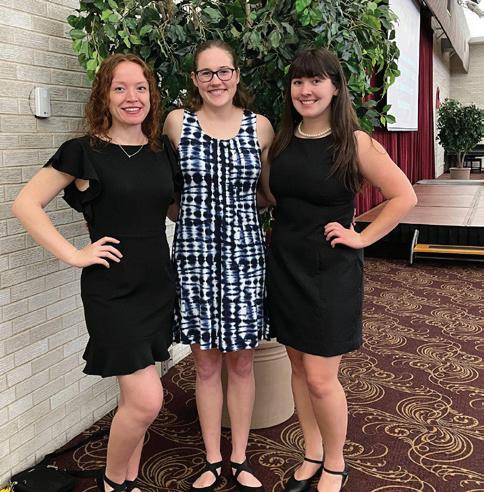
Learn more about mathematics! We host many lectures and presentations. We have hosted events such as learning LaTex or Geogebra, learning about math in other cultures, seeing how math appears within nature, and learning what math careers are out there.







Get volunteer hours! Working for our annual Book Sale or Mathapalooza (a volunteer tutoring event) is an easy and fun way to get much needed volunteer hours.
Anyone can join regardless of major/minor, but we have requirements for members:
Full Member
• Regularly enrolled student
• Completed three semesters of college classes (at least one at CMU)
• Cumulative GPA of 3.0 or higher
• Average of B or Higher in math classes
• Taken three college courses in mathematics
• Attended at least three meetings each semester
Questions? Email us at cmu.kme@gmail.com for more information.
Associate Member
• Regularly enrolled student
• Good academic standing
• Interested in mathematics

Dr. Hiruni Pallage (left), Dr. Bridgette Russell (right), and Dr. Christal Schoen (center), our recent PhD graduates, were honored to be 2024 MAA Project NExT fellows. Attached is their picture at the MAA Math Fest in Indianapolis!
MAA is the short name of Mathematical Association of America. Project NExT is a professional development program for new or recent Ph.D.s in the mathematical sciences, designed to help participants improve their teaching and research skills, foster connections with a nationwide network of peers, and enhance their involvement in the broader mathematical community.
You can find more information at https://maa.org/maa-projectnext/
Dr. Hiruni Pallage graduated in 2024 and is working at Centre College in Kentucky • Dr. Bridgette Russell graduated in 2023 and is working at Lake Superior State University • Dr. Christal Schoen graduated in 2020 and is working at Stephen Austin State University.


As was mentioned in last year’s newsletter, I am part of the ADVANCE leadership team at CMU and in August of 2023 we received a National Science Foundation (NSF) ADVANCE Adaptation award, a 3-year grant totaling $990,183. The NSF ADVANCE program contributes to the NSF’s goal of developing a more inclusive and diverse STEM workforce by providing universities with financial resources to improve the overall climate and culture for women faculty at their institution. (Please see page 10 of this newsletter for more information.)
Over the past year and a half, CMU’s ADVANCE team has brought many different initiatives to CMU. We have sponsored multiple sessions of “Speaking Up”, an interactive workshop that uses applied theatre techniques and a facilitated discussion which allows participants to identify incidents of bias and explore different ways to address those issues in positive and constructive ways. We also have begun an Advocates and Allies program here at CMU, which consists of a group of men on campus who are committed to becoming more knowledgeable and taking personal action in support of women and gender equity. This fall through our Engage and Elevate series, we brought two speakers to campus, one to talk about burnout in academia and the other to talk about boundaries and work-life balance. In addition, we are also working directly with departments to assist them in revising their departmental bylaws and faculty hiring processes to make their policies and practices more equitable. For more information about our upcoming events and other initiatives, consider following CMU ADVANCE on Facebook or Instagram!
Regarding teaching, each fall I have the opportunity to teach the “Women in STEM Fields” course that I developed a few years ago. This course is cross-listed with Women and Gender Studies (WGS) and explores the experiences, challenges, and contributions of women in STEM fields. I love teaching this course every fall, which is predominately taken by first-year students enrolled in one of the many STEM majors offered here at CMU. Not only do my students in this class always tell me that they learn so much by taking the course, every time I teach it I learn so much from them as well!
My research agenda continues to be related to women and other underrepresented groups in STEM fields as well. For years I have been exploring how gender affects women’s experiences as undergraduate mathematics students, however, more recently I completed a project with two undergraduate students in physics: Dakota Keblbeck and Cielo Medina Medina. For our project we explored the experiences of undergraduate physics students and how these experiences varied based on their intersectional underrepresented identities. In addition to gender, the underrepresented identities we included were: race/ethnicity, sexuality, international student status, first-generation college student, socio-economic status, and disability. We have presented our results at many venues around the country, including research seminars and the Physics Education Research Conference that was held in Grand Rapids in 2022. Our final paper on this work titled “Undergraduate physics students’ experiences: Exploring the impact of underrepresented identities and intersectionality” was published this past September in the Physics Review Physics Education Research journal.
Richtmeyer-Foust Mathematics Award 2024:
Recipient: Mariia Vetluzhskikh
Finalists:
• Emma Doederlein
• Aubrielle Dunn
• Julia Savage
• Tyler Thompson

Hammel KME Award: Recipients:
• Julia Savage
• Maleia Thompson
AMS Graduate Student Chapter Integration Bee:
Graduate Grand Integrator:
• Joyita Banerjee
Graduate Runner-up:
• Koksal Karakus
Undergraduate Grant Integrator:
• Ishani Gaidhane
Undergraduate Runner-Up:
• Jonathan Gregory

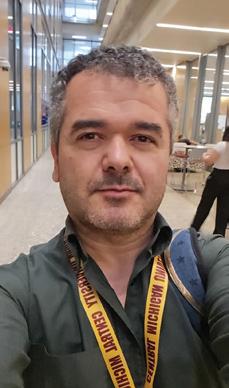
Michigan Autumn Take Home Challenge Exam:
• Julia Savage and Maleia Thompson
Putman Mathematical Competition:
• Michael Leiby
• Mariia Vetluzhskikh

Three Minute Thesis Competition: Hiruni Pallage
Outstanding Tutoring Awards:
Graduate Recipients:
• Riley Kench
• Gilbert-Anthony Rivera
Undergraduate Recipients:
• Alexis Analitis
• Rachel Swiderek


Outstanding Teaching Assistant Awards:
• Zachary Henderson
• Brooklyn Willett


Undergraduate Scholarships:
Brannan Family Scholarship:
• Katelyn Lyon
• Rachel Swiderek
Nikoline A. Bye Endowed Scholarship:
• Maleia Thompson
Jozefaciuk and Rutkowski Mathematics Scholarship:
• Nick Green
• Sophia Tali
Jennie Master Endowed Scholarship in Mathematics Education:
• Rachel Swiderek
Miller Mathematics Scholarship:
• Emily Dolan-Baker
Narayan Mathematics Scholarship:
• Jonathan Gregory
Richtmeyer Mathematics Scholarship:
• Kaitlyn Brandon
• Emily Dolan-Baker
• Julia Hoffman
• Michael Leiby
• Ruvarashe Musasiwa
Lester H. and Jack D. Serier Endowed Memorial Scholarship:
• Emily Dolan-Baker
St. Andre Endowed Award:
• Julia Hoffman
Whitmore Mathematics Scholarship:
• Madison Babbitt
• Lelaina Beauregard
• Maleia Thompson
In August of 2023, CMU was awarded a National Science Foundation (NSF) ADVANCE Adaptation award, a 3-year grant totaling $990,183. The main goal of the NSF ADVANCE program is to increase the representation and advancement of women faculty in STEM disciplines. In 2019, CMU obtained an NSF Catalyst award, which allowed CMU to do a self-study to determine the main barriers for women faculty in STEM at CMU. The goals of CMU’s 2023 Adaptation award are to provide CMU with resources to implement positive changes to address the barriers uncovered by the Catalyst award.
The three areas for growth identified through CMU’s catalyst award were to:
1. Implement programs to interrupt bias and increase allies
2. Develop more transparent and equitable policies and procedures
3. Develop more inclusive faculty-recruitment practices and enhance women faculty mentoring opportunities
The work of this project contributes to CMU’s new strategic plan. Although the NSF ADVANCE program is aimed around faculty, many of the programing and policy changes will also improve the culture and climate for women students and staff as well.
Some of the programming for the 2024-2025 academic year include:
• Speaking Up, an interactive bias awareness workshop, that allows participants to view moments of bias presented through applied theatre. A facilitated discussion allows participants to identify incidents of bias and explore different ways to address those issues in positive and constructive ways.
• Advocates and Allies, a program originally developed at North Dakota State University, that equips men with the knowledge, skills, and strategies to enact positive change at the personal, unit, and organizational levels.
• Engage and Elevate, a speaker series and mentoring program, that brings well-known scholars to CMU’s campus to host sessions surrounding topics related to personal and professional well-being and equitable leadership.
• Intersectional Equity-Based Leadership Training, a series intended specifically for department chairs and other faculty leaders on campus that focuses on: administrative and interpersonal skills needed to be an effective leader, how to handle difficult situations, equitable budgeting, and familybased leave policies at our institution.
The ADVANCE Adaptation leadership team at CMU is:
• Tracy Galarowicz, Associate Dean in the College of Science and Engineering
• Katrina Piatek-Jimenez, Faculty in the Department of Mathematics
• Kirsten Weber, Faculty in the School of Communication, Journalism, and Media
• Kimberly O’Brien, Faculty in the Department of Psychology
• Zach Evans, Director of the ADVANCE Program at CMU
For more information, please follow CMU ADVANCE on Facebook or Instagram!


Inthe Fall of 2023 I was on sabbatical leave at the University of Cambridge. During that time, I wrote a paper titled “A matroidal perspective on the tropical Prym variety”. In this paper, we show that the tropical Prym variety of a double cover of metric graphs can be recovered from Zaslavsky’s signed graphic matroid on the target graph, similar to how the Jacobian of a graph can be recovered from the graphic matroid. This paper has been accepted for publication.
During the summer of 2023, I wrote a paper titled “Chip-firing on graphs of groups”. This is the outcome of an undergraduate research project that I did with Margaret Meyer, who graduated from CMU in 2022. In this paper, we define the chip-firing map on a graph which is the quotient of another graph by a group action. It turns out that the correct way to do this is to weight the chip-firing map by the orders of the local stabilizers. As a result, the critical group of the graph admits a homomorphism to the critical group of the quotient. This paper has been accepted for publication.
In Spring 2024, I collaborated with Mariia Vetluzhskikh, an undergraduate student at CMU who graduated in 2024, and the outcome of our work is a paper called “Critical groups in abelian harmonic quotients”. In that paper, we compute the number of spanning trees of a graph that admits the action of an abelian group, in terms of certain matroidal data on the quotient graph. As an example, we give an elementary computation of the number of spanning trees of a dodecahedron. I am currently working to extend this result to non-abelian quotients.
My time at CMU was marked by a welcoming and supportive environment where students and faculty worked together toward success. The sense of belonging made it easy to thrive, with faculty always ready to help—whether in understanding complex math concepts or providing personalized mentoring.
Under Dr. Kim’s guidance, my Ph.D. research focused on brain imaging, which I had the opportunity to present at conferences like the Joint Mathematics Meetings and the ACS Sectional Meeting. This led to cross-disciplinary collaborations with the Chemistry department and a published paper. I also worked with faculty at Ball State University and my advisor on another research project in
dynamical sampling, resulting in additional published work.

Beyond research, CMU offered numerous opportunities for growth, including service on the AMS Executive Board and the DEIJB Committee, as well as teaching internships. Classes on college math instruction further prepared me for my current role as an Assistant Professor of Mathematics at Centre College. I am deeply grateful for the strong support network and abundant opportunities for personal and professional development that CMU provides.

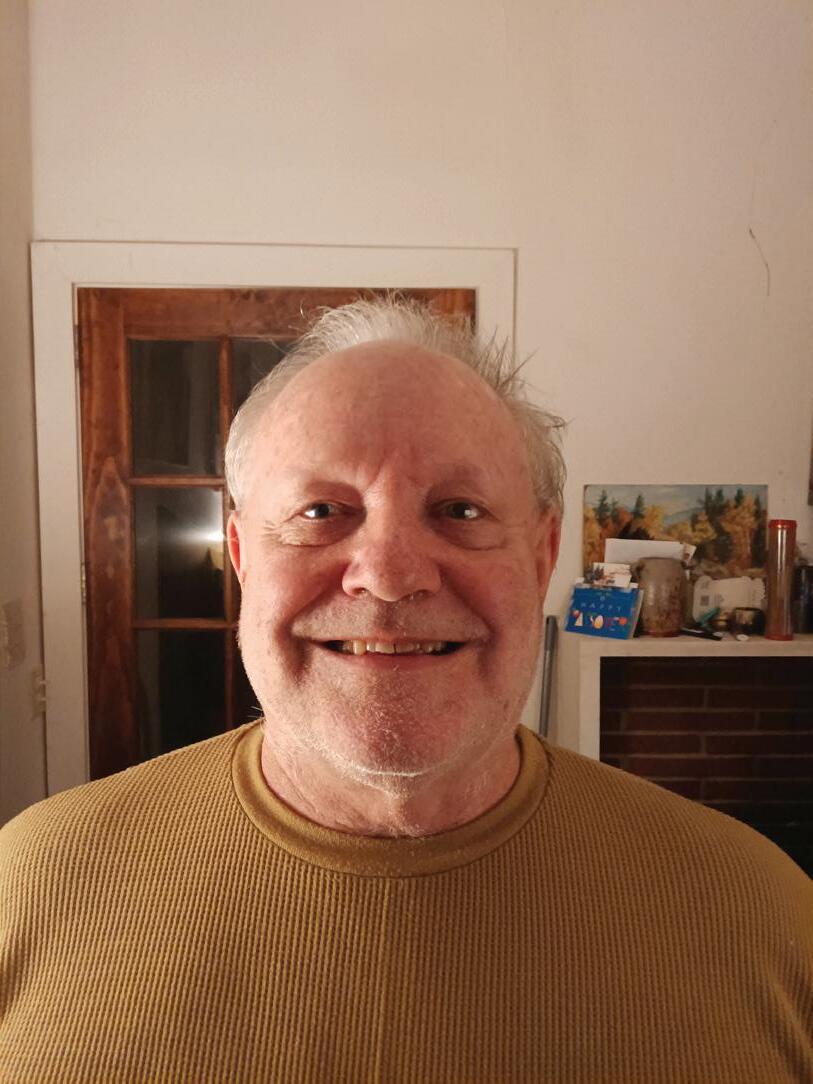
Inresearch, I work in applied mathematics with respect to finding solutions of higher order differential equations. I also work in number theory, in particular finding identities for Fibonacci and Lucas numbers.
I enjoy refereeing and reviewing research papers.
I am teaching numerical analysis and pre-calculus this semester. I view teaching as an opportunity to explore new ideas within the curriculum.


In Fall 2023, I taught MTH 332: Introduction to Mathematical Proof and MTH 133 Calculus II. In Spring 2024, I taught MTH 132 Calculus I and MTH 499: Capstone Course in Mathematics.
I had a group of very bright students in my MTH 133 class and five of them were students from the Mount Pleasant High School. I enjoyed teaching the MTH 332 and MTH 499 classes. In particular, I used the book titled “Proofs from THE BOOK" for MTH 499 which contains beautiful and elegant proofs for many well-known mathematical theorems.
My MTH 499 class had several outstanding students who performed extremely well in the Major Field Test in Mathematics given by the Educational Testing Service. The results of this ETS exam are also used for program assessment of Math Majors.
I enjoy working with students and mentoring them. In Fall 2023 Michael Leiby started working with me on his Honors Capstone Project. The title of the project is "Chromatic Numbers on the Triangular Honeycomb Chessboard". He will submit his project in December 2024.
I continued to work on research projects in combinatorial matrix theory and finite frame theory. Two manuscripts in matrix theory are currently under review. One jointly authored by my former Ph.D. student Dr. Ansam Al-Aqtash, Dr. Lon Mitchell and myself is currently under review. Another manuscript in finite frame theory jointly authored by my colleague Dr. Yeon Kim and former student Dr. Rachel Domagalski is also currently under review.


Two math PhD students – Edgar Santos Vega and Tyler Owen – have been awarded the King-Chavez-Parks Future Faculty Fellowship.
Edgar Santos is a PhD student in the mathematics department, concentrating on collegiate mathematics education. He is interested in research concerning ethnomathematics and mathematical achievement among Latiné and Indigenous students. Edgar plans to use the KCP Fellowship to network with other research professionals committed toward expanding diversity in graduate circles and to develop a career in postsecondary education.
TylerOwen, a first-generation Latino college student with late-diagnosed autism and ADHD, is pursuing a PhD in Mathematics with a concentration in Collegiate Mathematics Education. He proudly is balancing his roles as a teacher,
student, husband, and father. Tyler’s research focuses on instructor perceptions of textbook usage in graduatelevel courses, and he plans to use the KCP Fellowship to network with researchers and educators dedicated to making highter education and mathematics more accessible, especially for individuals from underrepresented identities.
The Future Faculty Fellows (FFF) Program was created by the Michigan State Legislature in 1986 as part of the larger King-Chávez-Parks (KCF) Initiative, designed to stem the downward spiral of college graduation rates for students underrepresented in postsecondary education. The purpose of the FFF Program is to increase the pool of academically or economically disadvantaged candidates pursuing faculty teaching careers in postsecondary education. Preference may not be given to applicants on the basis of race, color, ethnicity, gender, or national origin. Universities should encourage applicants who would otherwise not adequately be represented in the graduate student and faculty populations to apply.

FFF recipients are required, by signed agreement, to pursue and obtain a master’s or doctoral degree at one of the fifteen public universities in Michigan. FFF recipients are also obligated to obtain a postsecondary faculty teaching or approved administrative position at a public or private, 2- or 4-year, in-state or out-of-state postsecondary institution and remain in that position for up to three years equivalent full-time, dependent upon the amount of the Fellowship Award.
PhD in Mathematics
• Summer 2023-2024
• Pallage, Hiruni
Master of Arts in Mathematics
• Spring 2023-2024
• Millikin, Christina
• Summer 2023-2024
• Chauhan, Shalini
Mathematics Major, B.A.; B.S.
• Fall 2023-2024
• Kalota, Cody
• King, Leanna
• Alchin, Nathan
• Spring 2023-2024
• Prawdzik, Andreas
• Sander, Jadyn
• Gaidhane, Ishani
• Savage, Julia
• Doederlein, Emma
• Thompson, Tyler
• Mason, Kiefer
• VanHaitsma, Katelyn
• Ault, Xander
• Vetluzhskikh, Mariia
• Summer 2023-2024
• Patalon, Alaina
Mathematics Major, B.S. in Ed., Standard
Secondary Certificate
• Fall 2023-2024
• Taylor, Justin
• Moore, Zachary
• Wilson, Christine
• Spring 2023-2024
• Sander, Jadyn
• Romero, Kelly
• Powers, Aaron
• Dunn, Aubrielle
• Roach, Veronica
Mathematics Major, B.S. in Ed., Standard
Elementary Certificate
• Fall 2023-2024
• McKee, Gabriella
• Robison, Macy
• Joslin, Alyssa
• Barch, Hannah
• Patten, Sean
• Datema, Cade
• Moore, Lance
Mathematics Minor
• Fall 2023-2024
• Nestor, Nikki
• Maciejewski, Alyssa
• Severinski, Andrew
• Bishop, Harrison
• Raveane II, Dino
• Chatman, Ivette
• DeRees, Jacob
• Skrzynski, Rebekah
• Spring 2023-2024
• Sanchez, Brandon
• Findley, Brendan
• Velasco, Jose
• Johnson, Justin
• Chritz, Joseph
• Karbowski, Paige
• Klimczak, Cade
• Christiansen, Duncan
• Abdelgawad, Salma
• Odiakosa, Edwin
• Jones, John
• Auerbach, Jacob
• Warnke, Zachary
• Soulliere, Myla
• Lobert, Samuel
• St Pierre, Madeline
• Kline, Aaron
• Folkert, Lucas
• Meyers, August
• Isenberger, Cassandra
• Ashby, Lucas
• Agro, Nicholas
• Stengard, Sawyer
• Green, Anthony
• Grube, Ryann
• Plotkowski, Julia
• Green, Mitchell
• Heckel, Ian
• Lucas, Collin
• Donze, David
• Brennecke, Kyle
• Daoust, Brendon
• Reilly, Alec
• Stephens, Alex
• Brown, Jacob
• Timmer, Wallace
• Brindley, Dalton
• Summer 2023-2024
• Purgiel, Gavin
Mathematics Minor, B.S. in Ed., Standard Secondary Certificate
• Spring 2023-2024
• Newton, Patrick
• Lewis, Alexis
Mathematics Minor, B.S. in Ed., Standard Elementary Certificate
• Fall 2023-2024
• Catlin, Grace


Dr. Xiaoming Zheng works on applied mathematics including mathematical biology and numerical analysis. In Summer 2024, he worked with three talented and dedicated CMU students on an NSFsupported research project: “AI on PDE”. In Fig 1 (from left to right), they are Ruthwik Nadam, Edom Belayneh, and Chris Xiaobai Chen, and Dr. Zheng.

AI (artificial intelligence) is the new electricity, according to Dr. Andew Ng. In the summer, this group learned the basic knowledge of machine learning and worked on Boussinesq incompressible flows. This group presented their beautiful research results in two events: Discover CMU Day on July 15, 2024 and CMU and You Day on September 28, 2024.
Briefly speaking, AI on PDE is a new numerical method of using neural network to approximate PDEs. Each neuron has an activation function such as sigmoid or hyperbolic tangent to process a linear combination of signals with a weight assigned to each input signal and generate an output signal, as shown in Fig 2. A neural network is a linked structure of neurons as shown in Fig 3, which are just composite functions in mathematics.

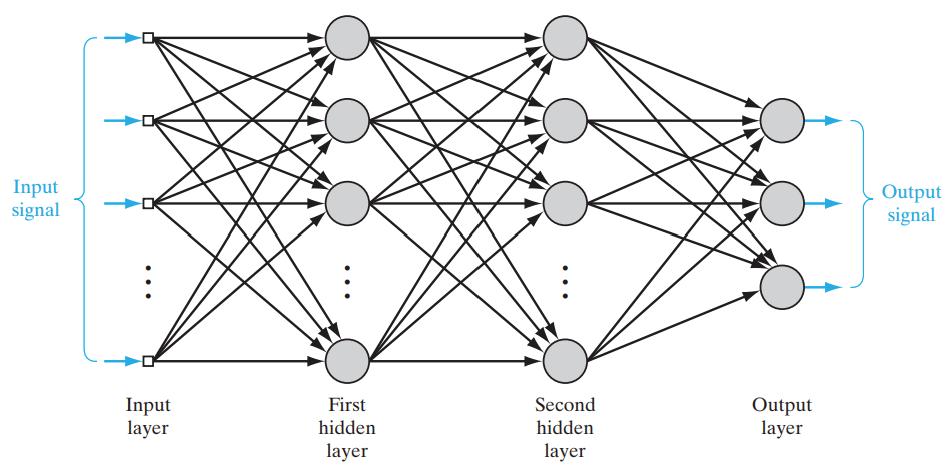
Machine learning involves training a neural network using a dataset with predefined input-output pairs. Initially, if the neural network's weights are not well-tuned, the output will deviate significantly from the expected values, resulting in a large error. This error is often quantified using a metric such as mean squared error (MSE). To minimize the error, an optimization algorithm is employed, adjusting the network's weights to minimize MSE. The so-called learning or training is just optimization.
Moreover, several mathematical principles are fundamental to machine learning. Among others, the universal approximation theory, such as the Stone-Weierstrass theorem, underpins the ability of neural networks to fit complex objects, tensors (including matrices and vectors) from linear algebra are used to represent all computable objects in AI, and the chain rule is central to the automatic differentiation which is the base of the gradient-descent based optimization methods. In this way, we say mathematics is one foundation of AI.
One popular language in AI is Python and there is a large community with open-source AI tools, including Jupyter and Google Collab as the platform to write and run the program, PyTorch and TensorFlow to provide basic mathematical computations such as tensor, and DeepXDE for specific PDE calculations (such as derivatives). A particular method we have worked on is called PINN (PhysicsInformed Neural Network). Unlike the conventional training data, the PDEs, which are mathematical expressions of physics, are the training data. More specifically, when equations are evaluated as discrete points, one obtains the core of the training data, along with the initial and boundary values.
In the summer, this group applied the PINN method to solve many PDE problems, such as hyperbolic conservation laws, heat equations, and Navier-Stokes equations. The following graphs show the timeindependent Navier-Stokes equations and the AI solution for a steady state channel flow. It was great fun to work with so many great math lovers on such an exciting project.

Fig. 4
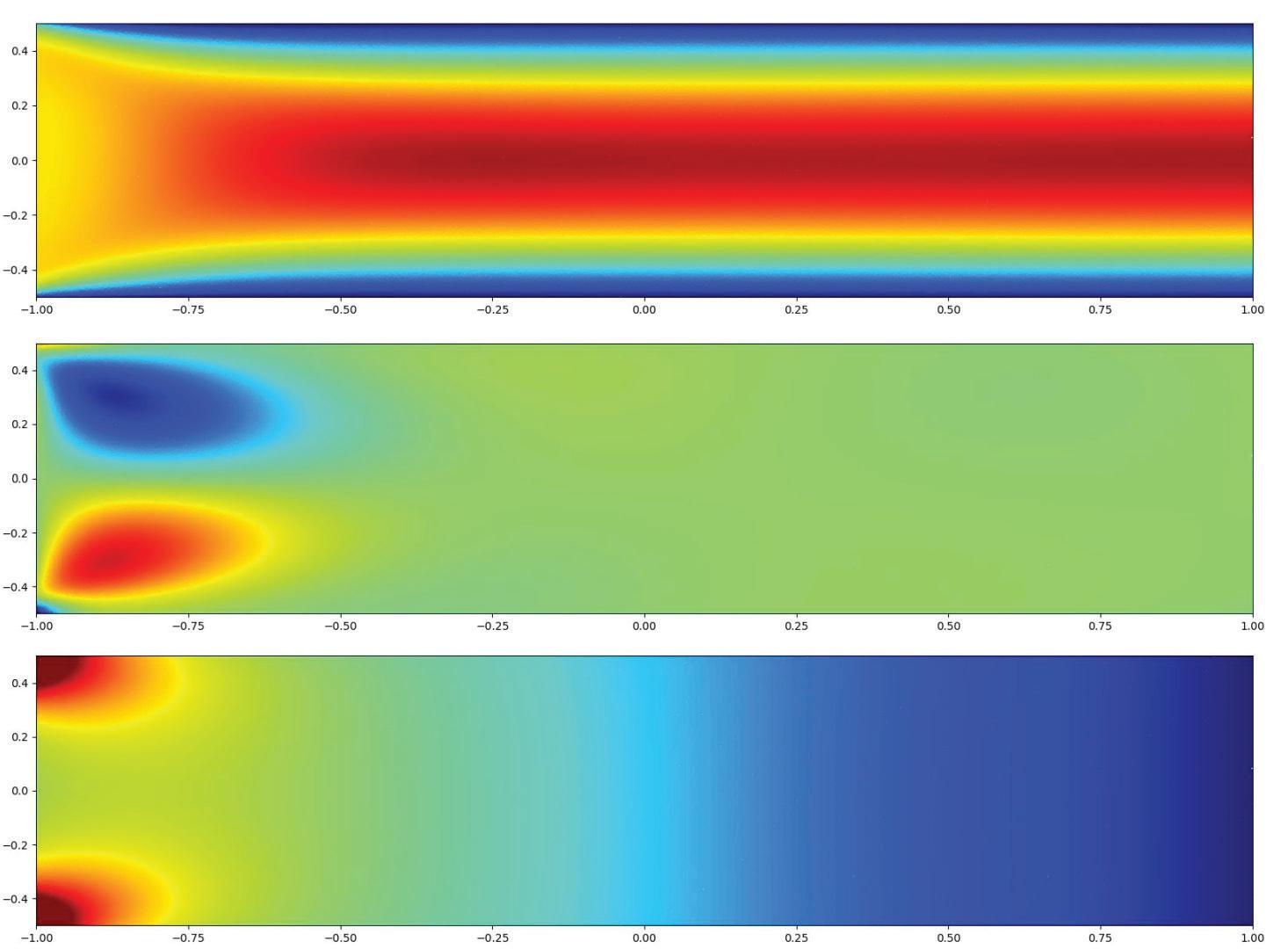


During my sabbatical at the University of Pennsylvania (fall 2023 & spring 2024), I advanced my research on biodegradable, biofriendly materials for applications in energy storage, medicine, water purification, virus filtration, and industry. I collaborated with faculty, Ph.D. students, postdocs, and medical professionals across medical schools, engineering, and applied sciences. Two research
articles, on energy storage with cellulose-based materials and dental material characterization, have been submitted to refereed journals. A third article, focused on water and virus filtration with modeling, simulation, and rheological fluid flow characterization, is in preparation.
During my sabbatical, I collaborated with two Ph.D. students, several undergraduates, and CMU engineering and chemistry faculty. Undergraduates Weible (Chemistry) and Sikora (Engineering) are preparing a publication on the rheological properties of chitosan with and without salt. Ph.D. student Karakus (Math) modeled glassy dynamics with applications in materials science and biology, recently publishing in Soft Matter, with an invitation for a cover feature. Ph.D. student Henderson (Math) studied disease transmission via network analysis on transport systems and is preparing for publication; his work with UPenn Medical School will extend into brain network and virus transport studies. Koksal, Henderson, and other undergraduates have presented their research at multiple scientific meetings.
In collaboration with faculty members from Chemistry and Physics, I also secured an Army grant during this period.


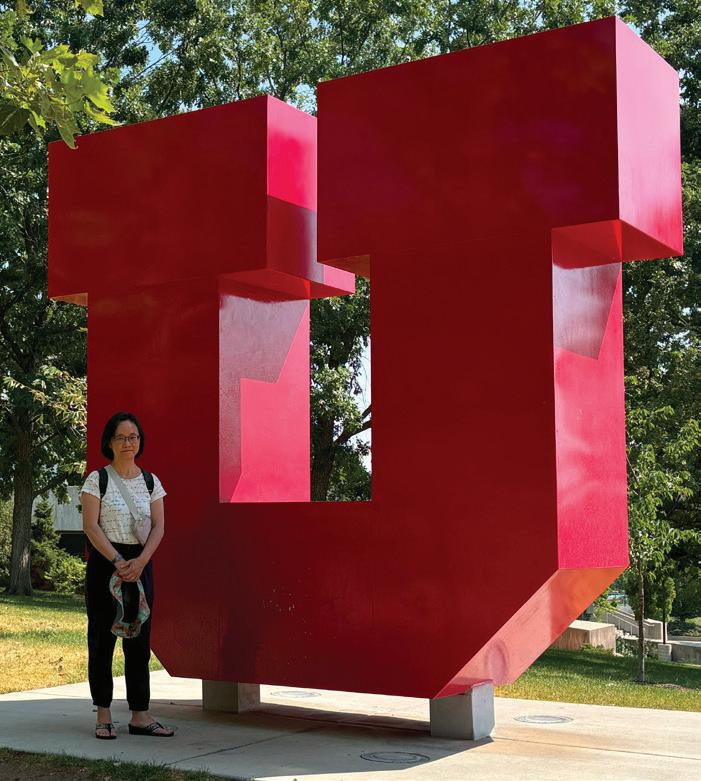
Dr. C-Y. Jean Chan’s research interests concern the algebraic structures of the solution set arising from a system of polynomial equations. Her research activities often involve intensive interactions between algebra and geometry. Many of her projects are highly motivated by the questions’ geometric nature. And she incorporates such philosophy in the content of her lectures to students at CMU whenever possible.
At CMU, Dr. Chan teaches classes from 100 to 700 levels, including Algebra courses of all levels and Calculus series, but one of her favourite courses to teach is Ordinary Differential Equations.
During the 2023-2024 academic year, besides regularly scheduled classes, Dr. Chan supervised a Masters Plan B paper on Singular
Value Decomposition, a Ph.D. graduate student’s teaching internship on Linear Algebra, and an independent study on topics related to Algebraic Geometry and Commutative Algebra.
Currently Dr. Chan is working on affine semigroup rings in understanding their singular properties, and differential operators. Affine semigroup rings can be understood as a beautiful disguise of many concepts appearing in geometry. Dr. Chan’s approaches make use of the ring’s underlying combinatorial structures -- a natural but non-classical approach in Algebra.
In the recent years, Dr. Chan began to work on the Milnor numbers of singular algebraic curves. Her study falls into the topic of motivic homotopy theory a hybrid of topology and algebraic geometry developed only in the late 1990s.
Dr. Chan collaborates with fellow researchers across the United States and overseas in Taiwan. In Year 2023-2024, Dr. Chan’s research projects were supported by American Institute of Mathematics (AIM on the Caltech campus) and Park City Mathematics Institute sponsored by Institute for Advanced Study (IAS/PCMI, Utah).



